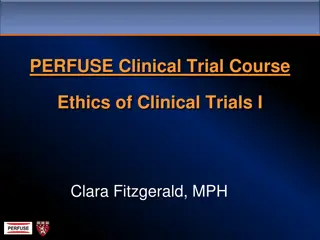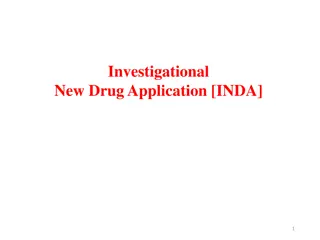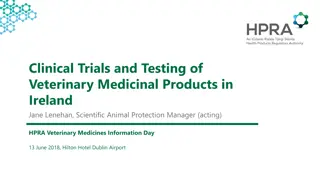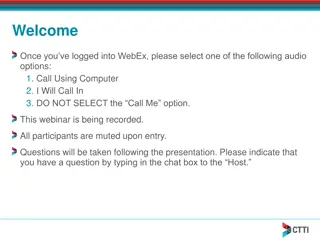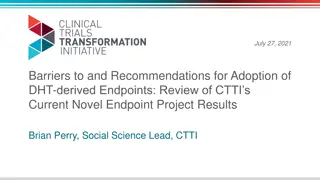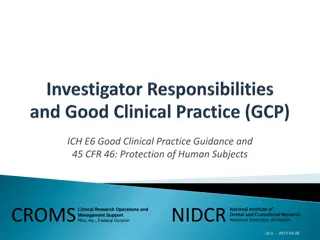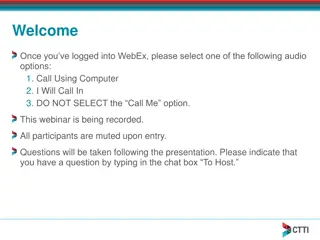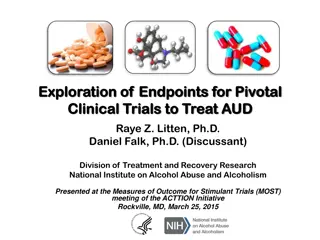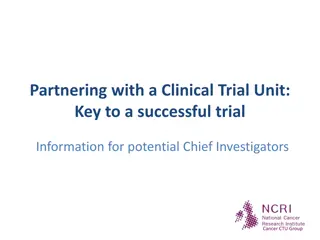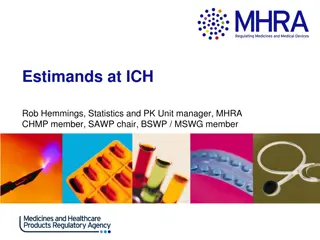Understanding Investigational Products in Clinical Trials
Investigational products play a crucial role in clinical trials, encompassing drugs, devices, biologics, and more. The FDA defines investigational new drugs as substances seeking approval, even if previously in use, with potential changes. Similarly, investigational devices are those under investigation. ICH GCPs specify investigational products as pharmaceutical forms being tested in clinical trials, which may include marketed products used in new ways. Ensuring accountability in handling investigational products is vital to compliance and participant safety in studies. Inventory records play a key role in documenting the proper use of investigational products as per approved protocols.
Uploaded on Jul 25, 2024 | 0 Views
Download Presentation

Please find below an Image/Link to download the presentation.
The content on the website is provided AS IS for your information and personal use only. It may not be sold, licensed, or shared on other websites without obtaining consent from the author. Download presentation by click this link. If you encounter any issues during the download, it is possible that the publisher has removed the file from their server.
E N D
Presentation Transcript
Session 11: Investigational Product Derita: Margaret: mlynn@uthsc.edu dbran@uthsc.edu https://tnctsi.uthsc.edu/training-and-education/seminars- and-workshops/tn-ctsi-certification-exam-preparation- course/
Handouts/Reference sheets/Worksheets: NIH IP Accountability Tool Summary Sheet IP Accountability Reference Sheet Webinars: Research 101, session 10
"...a new drug or biological drug that is used in a clinical investigation." In the U.S. Food and Drug Administration (FDA) regulations, an investigational new drug is any substance (such as a drug, vaccine or other biological product) for which FDA approval is being sought FDA s CFR Definition of an Investigational New Drug A drug may be considered new even if it has been in use for years if a change is proposed in its use, formulation, route of administration, use in patient population where risk would be increased, or packaging
FDAs Definition of an Investigational Device Means a device, including a transitional device, that is the object of an investigation
ICH GCPs Definition an Investigational Product A pharmaceutical form of an active ingredient or placebo being tested or used as a reference in a clinical trial (ICH GCP 1.33). This may include a marketed product that is being used in a different form than the one it was approved for, or a marketed product being used for an unapproved or new indication.
Includes the following being studied in a clinical trial: Drug Investigational Product Device Biologic
Investigational Product Accountability
Inventory records document that IP was used only for study participants in accordance with the approved protocol Purpose of IP Accountability Ensure study participants: are in compliance with the protocol receive the correct IP
Why is IP Accountability Needed? Subject safety Documents the handling of the IP Identifies subjects who have received the IP/Ensure study participants receive the correct IP Document compliance with the protocol Verify data integrity
PROCESS includes: Receipt IP Accountability Process Storage Distribution Return/Destruction Compliance
21 CFR 312 Regulations 21 CFR 812 ICH GCP E6 (R2)
21 CFR 312 Subpart D 312.59 Disposition of unused supply of investigational drug 312.57 Recordkeeping and record retention 312.59 The sponsor shall assure the return of all unused supplies of the investigational drug from each individual investigator whose participation in the investigation is discontinued or terminated. The sponsor may authorize alternative disposition of unused supplies of the investigational drug provided this alternative disposition does not expose humans to risks from the drug. The sponsor shall maintain written records of any disposition of the drug in accordance with 312.57 312.57 A sponsor shall maintain adequate records showing the receipt, shipment, or other disposition of the investigational drug. These records are required to include, as appropriate, the name of the investigator to whom the drug is shipped, and the date, quantity, and batch or code mark of each such shipment
21 CFR 312 Subpart D An investigator shall administer the drug only to subjects under the investigator's personal supervision or under the supervision of a sub-investigator responsible to the investigator. The investigator shall not supply the investigational drug to any person not authorized under this part to receive it 312.61 Control of the Investigational Drug Disposition of the drug: An investigator is required to maintain adequate records of the disposition of the drug, including dates, quantity, and use by subjects. If the investigation is terminated, suspended, discontinued, or completed, the investigator shall return the unused supplies of the drug to the sponsor, or otherwise provide for disposition of the unused supplies of the drug under 312.59 312.62 Investigator Recordkeeping and Record Retention
21 CFR 312 Subpart D If the investigational drug is subject to the Controlled Substances Act, the investigator shall take adequate precautions, including storage of the investigational drug in a securely locked, substantially constructed cabinet, or other securely locked, substantially constructed enclosure, access to which is limited, to prevent theft or diversion of the substance into illegal channels of distribution 312.69 Handling of Controlled Substances
ICH GCP E6 (R2) 4.6 Investigational Product(s) 4.6.1 Responsibility for investigational product(s) accountability at the trial site(s) rests with the investigator/institution 4.6.2 Where allowed/required, the investigator/institution may/should assign some or all of the investigator s/institution s duties for investigational product(s) accountability at the trial site(s) to an appropriate pharmacist or another appropriate individual who is under the supervision of the investigator/institution 4.6.3 The investigator/institution and/or a pharmacist or other appropriate individual, who is designated by the investigator/institution, should maintain records of the product s delivery to the trial site, the inventory at the site, the use by each subject, and the return to the sponsor or alternative disposition of unused product(s). These records should include dates, quantities, batch/serial numbers, expiration dates (if applicable), and the unique code numbers assigned to the investigational product(s) and trial subjects. Investigators should maintain records that document adequately that the subjects were provided the doses specified by the protocol and reconcile all investigational product(s) received from the sponsor
ICH GCP E6 (R2) 4.6.4 The investigational product(s) should be stored as specified by the sponsor (see sections 5.13.2 and 5.14.3) and in accordance with applicable regulatory requirement(s) 4.6.5 The investigator should ensure that the investigational product(s) are used only in accordance with the approved protocol 4.6.6 The investigator, or a person designated by the investigator/institution, should explain the correct use of the investigational product(s) to each subject and should check, at intervals appropriate for the trial, that each subject is following the instructions properly
ICH GCP E6 (R2) 4.7 Randomization Procedures and Unblinding The investigator should follow the trial s randomization procedures, if any, and should ensure that the code is broken only in accordance with the protocol. If the trial is blinded, the investigator should promptly document and explain to the sponsor any premature unblinding (e.g., accidental unblinding, unblinding due to a serious adverse event) of the investigational product(s)
ICH GCP E6 (R2) Essential Documents Section 8
8.2.14 INSTRUCTIONS FOR HANDLING OF INVESTIGATIONAL PRODUCT(S) AND TRIALRELATED MATERIALS (if not included in protocol or Investigator s Brochure) To document instructions needed to ensure proper storage, packaging, dispensing, and disposition of investigational product(s) and trialrelated materials 8.2.15 SHIPPING RECORDS FOR INVESTIGATIONAL PRODUCT(S) AND TRIAL-RELATED MATERIALS To document shipment dates, batch numbers and method of shipment of investigational product(s) and trialrelated materials. Allows tracking of product batch, review of shipping conditions, and accountability Essential Documents Section 8 8.2.17 DECODING PROCEDURES FOR BLINDED TRIALS To document how, in case of an emergency, identity of blinded investigational product can be revealed without breaking the blind for the remaining subjects treatment 8.2.18 MASTER RANDOMIZATION LIST To document method for randomization of trial population
8.3.1 INVESTIGATORS BROCHURE UPDATES To document that investigator is informed in a timely manner of relevant information as it becomes available 8.3 During the Clinical Conduct of the Trial 8.3.8 DOCUMENTATION OF INVESTIGATIONAL PRODUCT(S) AND TRIAL-RELATED MATERIALS SHIPMENT 8.3.23 INVESTIGATION PRODUCTS ACCOUNTABILITY AT THE SITE To document that investigational product(s) have been used according to the protocol
8.4.1 INVESTIGATIONAL PRODUCT(S) ACCOUNTABILITY AT SITE To document that the investigational product(s) have been used according to the protocol. To document the final accounting of investigational product(s) received at the site, dispensed to subjects, returned by the subjects, and returned to sponsor 8.4 After Completion or Termination of the Trial 8.4.2 DOCUMENTATION OF INVESTIGATIONAL PRODUCT DESTRUCTION To document destruction of unused investigational products by sponsor or at site 8.4.6 TREATMENT ALLOCATION AND DECODING DOCUMENTATION Returned to sponsor to document any decoding that may have occurred
Who is Responsible for IP Accountability? Investigator Qualified study team members that have been delegated this task Sponsor/CRO Pharmacist
Results of Poor IP Accountability Subject may incur a safety risk Loss of data/data integrity Sponsor may place a hold on the study if non- compliance is severe Negative monitoring/auditing reports
Records/Essential Documents: o Receipt of the IP at the study site o Secured location of IP (locked/limited access) o Dispensing records o Return of IP from subject o Subject Compliance o Return to sponsor/CRO o Destruction o Storage o Expiration dates o Inventory o Temperature logs/excursions Documentation of the IP
Documentation of the Receipt of the IP at the Site Lot #, expiration date, Batch/serial information/unique code (all that are applicable) Name of person receiving IP (qualified delegated personnel) Date of receipt Name of IP Dosage Expiration date Quantity
What to Document When Dispensing IP Lot #, expiration date, Batch/serial information/unique code (all that are applicable) Subject ID Name identifier of IP Dose Name of the person dispensing Subject Date dispensed Quantity instructions/education
What to Document When the Subject Returns IP Lot #, expiration date, Batch/serial information/unique code (all that are applicable) Name of medication Dose Name of the person receiving Date returned Quantity returned Compliance
What to Document When Destroying/Returning IP Lot #, expiration date, Batch/serial information/unique code (all that are applicable) Name of medication Dose Date destroyed Quantity destroyed Means of destruction Name/title/signature of the person destroying Name/title/signature of at least one witness
Documents to be Maintained Investigational brochure, package insert, or device manual, all versions Include dates, quantities, batch/serial #/lot #s/unique codes, expiration dates Documentation of study product shipment/receipt/dispensing /return/disposal Sample of product label Randomization instructions, if applicable Instructions for IP handling Temperature log, when applicable Storage/maintenance instructions Calibration of all equipment, ie. Freezers/refrigerators Unblinding procedures, as applicable Subject IP Delegation of Authority log accountability/compliance
Complete the log as study product is received dispensed/returned/destroyed Follow ALCOA-C Best Practices Number each page of the IP accountability records Store pages in reverse chronological order Identify the final page of the log at the close-out of the study
Charging for IPs Charging for Investigational Medical Devices and Radiological Health Products for an investigational device, however, the charge should not exceed an amount necessary to recover the costs of manufacture, research, development, and handling of the investigational device [21 CFR 812.7(b)]. A sponsor justifies the proposed charges for the device in the IDE application, states the amount to be charged, and explains why the charge does not constitute commercialization [21 CFR 812.20(b)(8)]. FDA generally allows sponsors to charge investigators for investigational devices, and this cost usually is passed on to the subjects. The Investigational Device Exemption (IDE) regulations allow sponsors to charge Charging for Investigational Drugs and Biologics Investigational Drugs Under an Investigational New Drug Application; Expanded Access to Investigational Drugs for Treatment Use; Final Rules. These rules address clinical studies conducted under an IND as well as treatment protocols and treatment INDs. These rules and the accompanying preamble are available at http://edocket.access.gpo.gov/2009/pdf/E9-19004.pdf On August 13, 2009, FDA issued 21 CFR Part 312 and 316 Charging for
Who should explain the correct use of IP to a subject and how often? A. Any qualified member of the study team, as needed B. PI and pharmacist, every visit C. Any qualified member of the study team that has been delegated the task, before and during the conduct of the study often and as needed D. PI and Pharmacist, as needed
When should IP accountability be performed? A. Before, during, and at the closure/termination of the study B. Before, during, and at the closure/termination of the study and at each study and monitoring visit C. Before, during, and at the closure/termination of the study and at designated interval times as required by the pharmacist D. Before, during, and at the closure/termination of the study and at monitoring visits
A 1572 is a contract between A. The PI and the sponsor B. The PI and the CRO C. The PI and the FDA D. The PI and the IRB
According to FDA CFRs, the Investigators Brochure (IB)must be created by the _____ and provided to the ____. A. Investigator, Sponsor B. CRO, Sponsor C. Sponsor, IRB/IEC D. Sponsor, Investigator
Which of these statements is not part of the 1572 PI commitment? A. I agree to conduct the study(ies) in accordance with the relevant, current protocol(s) and will only make changes in a protocol after notifying the sponsor, except when necessary to protect the safety, rights, or welfare of subjects. B. I agree to personally conduct or supervise the described investigation(s). C. investigational purposes and I will ensure that the requirements relating to obtaining informed consent in 21 CFR Part 50 and institutional review board (IRB) review and approval in 21 CFR Part 56 are met. I agree to inform any patients, or any persons used as controls, that the drugs are being used for D. in accordance with 21 CFR 312.64. I agree to report to the sponsor adverse experiences that occur in the course of the investigation(s) E. risks and side effects of the drug. I agree to ensure that all associates, colleagues, and employees assisting in the conduct of the study(ies) are informed about their obligations in meeting the above commitments. I have read and understand the information in the investigator s brochure, including the potential F. those records available for inspection in accordance with 21 CFR 312.68. I agree to maintain adequate and accurate records in accordance with 21 CFR 312.62 and to make G. for the initial and continuing review and approval of the clinical investigation. I will ensure that an IRB that complies with the requirements of 21 CFR Part 56 will be responsible H. problems involving risks to human subjects or others. Additionally, I will not make any changes in the research without IRB approval, except where necessary to eliminate apparent immediate hazards to human subjects. I also agree to promptly report to the IRB all changes in the research activity and all unanticipated I. all other pertinent requirements in 21 CFR Part 312. I agree to comply with all other requirements regarding the obligations of clinical investigators and





